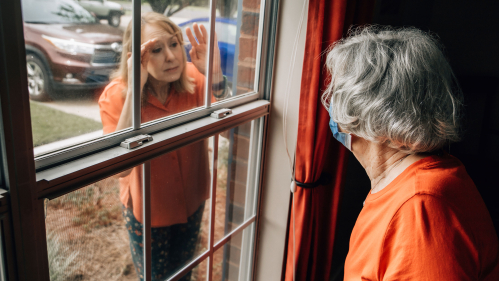How Caregivers of People with Dementia Can Navigate Holidays During the Pandemic

A Rutgers elder care expert discusses how families can help their loved ones during a holiday in isolation
As COVID-19 cases increase in New Jersey and across the nation, many caregivers are trying to navigate the holidays for relatives with dementia or Alzheimer’s disease. The Centers for Disease Control and Prevention suggests that people not travel to limit the potential spread of the coronavirus.
Mary Catherine Lundquist, program director of Care2Caregivers, a peer counseling helpline (800-424-2494) for caregivers of people with dementia and Alzheimer’s disease operated by Rutgers Behavioral Health Care, discusses how families can stay connected with their loved ones.
How can family of people with Alzheimer’s or dementia navigate the holidays, especially during the pandemic?
Even in the best of times, holidays can be a mixed bag for families who are caring for a loved one with an age-related illness that causes physical and mental changes. Focus on family togetherness and joy. People dealing with significant illnesses such as Alzheimer’s disease may be experiencing other feelings, such as sadness, worry and even exhaustion. Sometimes the best gift we can give to each other is to be present.
Check in with your elderly family members, especially those who are caregivers. Ask them how they are doing and then really listen. Be non-judgmental and acknowledge what they are sharing. Listen for what they really need, not for what you think they need — and then offer it. Dropping off groceries, fixing a broken fence post, calling a few times a week to just chat may be the best gifts. Writing a letter telling them what you mean to them and how they have impacted your life is a wonderful gift they can read again and again.
How can family help people who have lost a loved one to COVID-19 or who are in a nursing home and have limited time to visit?
If you know someone whose loved one is a nursing home or someone who may have lost a loved one to death this year, you can make a difference by reaching out as these friends likely are having a difficult holiday season.
Call them to check in, send a hand-written note, drop off flowers or send a text to say “thinking of you,” which can help ease loneliness and social isolation. Let them know that just because their loved one is not in the house with them anymore, they are not forgotten.
What is the difference between physical distancing and social isolation?
Social distancing doesn’t have to mean social isolation. Even though we may not be able to be in the same room, we can still find ways to feel connected. Some families are making traditional foods and then dropping them off on family members’ porches. Later in the day, they will all eat at the same time and connect over the phone or through a phone app. They may sing songs together, retell family stories, play games or share seasonal prayers.
What are the best ways to connect with elderly relatives through technology?
There is nothing like a good old-fashioned phone call. Although texting is the preferred method of communication in 2020, many parents and grandparents prefer to talk on the phone.
Depending on the age and technical skill of your elderly family member, there are many options to help them stay connected during the pandemic, including cell phones, smartphones, tablets and laptops. Tablets are good options as they offer many of the features of a smartphone but with a bigger screen. Chrome books are an inexpensive way for seniors to get some enhanced access to technology. Platforms such as Zoom, FaceTime and WhatsApp are easy for seniors to navigate and give them the added benefit of seeing the person as well. Spending time helping seniors purchase these devices and then practicing with them to help them learn is also a great holiday gift that will keep on giving.
How do we find joy this season?
Remember these times are temporary. Encourage your loved ones to share stories about hard times they have experienced in the past and how they coped. Let them know you see their strengths. As winter approaches, we turn up the lights inside and stoke the fire to feed our hope. Every day we can throw a few coals on the fire by reaching out to connect with each other through simple things such as sending cards, calling on the phone, scheduling time to have tea or lunch, watch TV or listen to music together on the phone.
Things may be different this year, but they can still be good as long as we focus on what really matters: appreciating each other and being there for each other.
For more information and resources, call the Caregivers2Caregivers Helpline at 800- 424-2494 or visit: www.copsainstitute.com.


